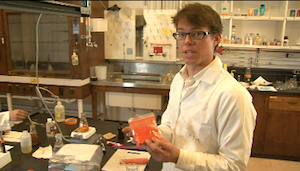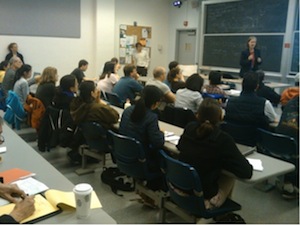By Ann Brody Guy
The University of California, Berkeley, will develop the first-ever college course on the public ethics of green chemistry, supported by a grant from the National Science Foundation, it was announced last week.
The Berkeley Center for Green Chemistry (BCGC), which launched in 2010, will develop the course.
"As chemistry takes a concerted step toward sustainability, students need tools to address the questions of ethics and values that are at the intersection of technology, public health, business practices, societal norms and governance," said Dr. Megan Schwarzman, a research scientist with the UC Berkeley School of Public Health, who with Alastair Iles, an assistant professor of environmental science, policy and management, is a principal investigator of the project.

UC Berkeley is already one of a growing number of universities in the U.S. with a robust green-chemistry program, but is unique, Iles said, in that it includes not just chemists but lawyers, business professors, toxicologists, and, like himself, policy experts.
BCGC executive director Marty Mulvihill said that the need for an interdisciplinary ethics education is a natural outgrowth of recent developments in the green chemistry field. As the field grows, Mulvihill said, even more complex concerns need to be addressed.
"How do you compare the impact of one ton of CO2 emitted into the atmosphere to that of one milligram of an endocrine disrupter in our water supply, or compare the value of $1,000 spent on complying with environmental regulations with $1,000 spent on economic growth?" he said.
Weighing these issues requires substantial technical knowledge, but also involves ethical and moral judgments about the importance of environmental sustainability, public health and economic growth, Mulvihill said. "Citizens, scientists, workers, politicians and businesses leaders are regularly asked to make these judgments through decisions that have far-reaching impacts on the future sustainability of our society."

Marty Mulvihill, Berkeley Center for Green Chemistry
For example, Mulvihill said, the disposal of drugs in toilets has resulted in measurable amounts of chemical substances in watercourses, which negatively affects the development and reproduction of wildlife in the ecosystem. On the business and policy sides of the same issue, drug companies need to be aware of the environmental impacts of their manufacturing processes and need to be incentivized to produce a minimum amount of waste.
Iles said the course's aim is to draw attention to the critical role of ethics in understanding why and how legal, market, business, political and societal systems can affect the chemical production system.
"Students will be immersed in situations that require ethical decision-making of the kind that practitioners face daily," Iles said.
The two-year grant totals $300,000. The BCGC project team also includes Joseph H. Guth, a School of Public Health research scientist, and Christine Rosen, an associate professor at the Haas School of Business. Part of the new course will be trialed for the first time during the spring 2012 semester.

Haas School of Business professor Christine Rosen teaches graduate students about the business drivers for green chemistry. Rosen is a collaborator on the new NSF ethics education training grant.
The new course builds on the momentum created by the BCGC's educational efforts over the past 18 months. With support from California EPA's Department of Toxic Substances Control (DTSC), the BCGC introduced new undergraduate laboratory curricula in introductory chemistry classes last year, developed an interdisciplinary graduate class in green chemistry, and continued offering two additional graduate-level seminar courses. They held their first event last year -- a sold-out national conference.
A second year of funding from DTSC is supporting further course development for undergraduate labs and advanced graduate seminars. Together with the new ethics class, plans to continue its leadership role in the field by consolidating the new courses into one of the first designated academic emphases in Green Chemistry, offering UC Berkeley graduate students the chance to delve deeply into this emerging field.
